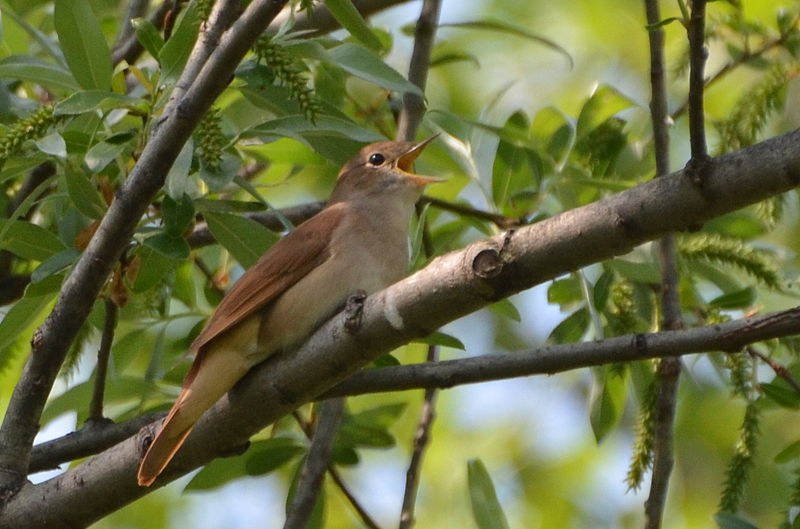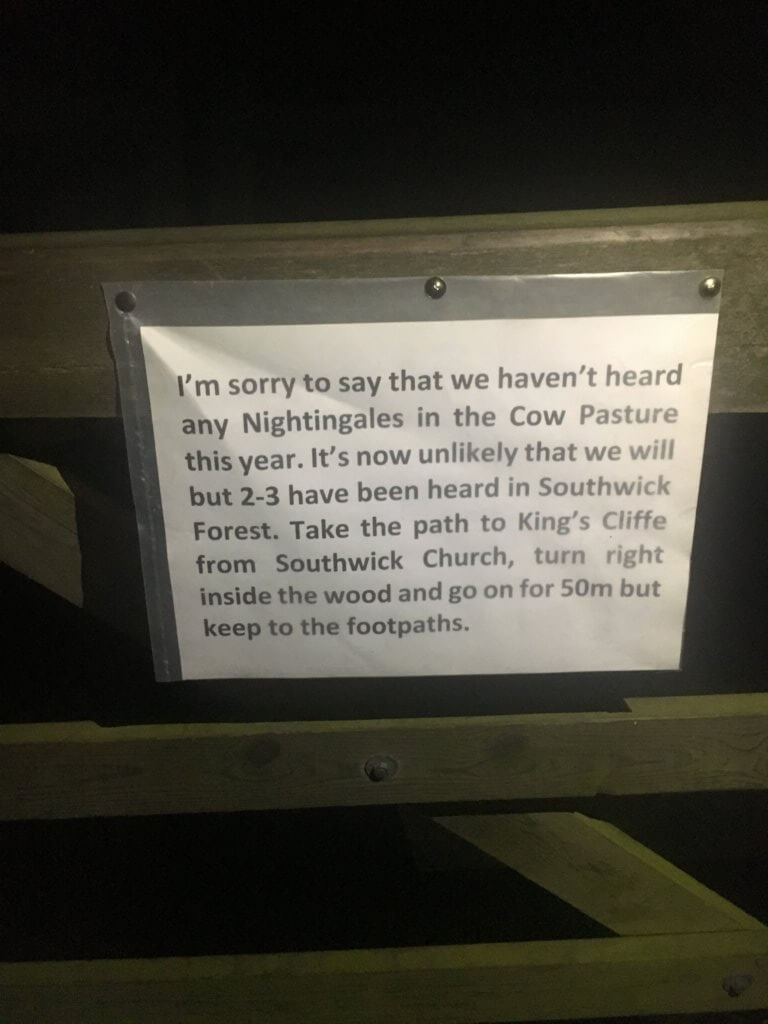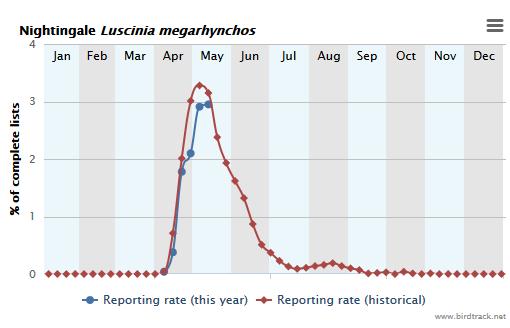
I write about this almost every year (2010, 2012, 2103, 2014, 2016) because that visit to a local wood has become a tradition. I’ve been there with my mum and my late father (over 20 years ago), and I’ve been there with my kids when it meant them staying up late (a treat!) to be able to come and listen and I’ve been there with my kids now they are in their 20s. I was kind of imagining, though I don’t spend that much time thinking about it, that I might, some day, go there with a grandchild. But I almost always make the trip.
So imagine my feelings when this greeted me on a recent visit:

I’m not sure you can imagine actually. I was very upset. I am still upset. The world is not spinning in the proper way – spring has not brought the Nightingales back to Glapthorn.
We stood in the wood for quite a while hoping in vain for a Nightingale to burst into reassuring song but it didn’t happen. This Wildlife Trust reserve still looks great for Nightingales (though I am not actually a Nightingale and their view matters more than mine) but it’s not as though the place has been trashed. It looks as though it has perfect habitat still, and that the Wildlife Trust has done the right mixture of management and benign neglect that should work.
But they aren’t there.
And Birdtrack suggests that nationally Nightingales are late and low this year.

And I haven’t yet seen a House Martin in my street. And Swift numbers are definitely down at the moment. These things are as important to me as Brexit, interest rates and the cost of living. In some ways, more important, because they are fundamental aspects of how the world is working, or not working, rather than artificial human constructs.
I shall be writing to my MP about Nightingales.
[registration_form]
I understand your sadness Mark, Chiffchaffs haven’t returned to the area in front of my house. Although not quite as glamorous as a Nightingale their abscence troubles me greatly nonetheless.
Exactly. Each population a thread trough evolutionary history, being broken one by one. I hope Nightingales are capable of recolonising areas.
Mark,
I feel the sore disappointment that you experienced. My patch, about 18
hectares of old gravel pit used to be stuffed with them. They dwindled to zero singing for about 4 years, with single ones giving a song last year and the one before, for a few days in late May, but probably not breeding.
Again it appears to me, and others that there is ample habitat.
We did have a disappearance of Nightingales in the past for a gap of a few years but they did bounce back strongly. Possibly this followed better winter conditions in Africa. I only hope that they return to all of us, in the same manner.
Nightingale, as well as Swifts and House Martins, seem well down this year in Kent. Very worrying.
Has it not occurred to you, Mark, that never-ending human population growth is incompatible with a healthy environment?
Let’s put it another way. Never-ending economic growth is also incompatible with a healthy environment.
There is nothing ‘natural’ about what is happening to the world, these days.
Keith – obviously it has never crossed my mind even though you mention it all the time. Many thanks.
But Keith, economic growth is how you increase people’s standard of living which should lift many of the poor out of poverty which always means they procreate far less profusely. It is mainly the poor driving world population growth, so we have to have economic growth to get them wealthy.
Dick that’s true and needs to be said over and over. And one of the best and quickest ways to break the population-poverty cycle is to empower young girls and women by funding their proper and education.
Keith, the trouble is that we didn’t do very well when the world population was thousands of times less than today’s billions. Look at all the prehistoric mega-fauna extinctions which came about through mass over-hunting in the Americas and elsewhere.
Well if that’s your diagnosis Keith, what do you propose is done about it? Or are you simply saying that we are f*cked?
I’ve been doing some research looking through early meteorological registers for Exeter. For the 24th April 1864 there is a note ‘nightingale heard’ and ‘cuckoo heard’ on the 19th. Who knows when a nightingale was last heard in Exeter and I haven’t heard a cuckoo anywhere in the UK for years now. Sad.
We’ve got Chiffchaffs and Blackcaps in fair numbers, but we’re short on Willow Warblers. Nightingales are something we might dream about – but never hear.
There haven’t been any bullfinches or pied wagtails in this part of the world either this year. Not as glamorous as nightingales I know, but I miss them all the same. They usually vanish over winter to the town lower down, but they ought to have been back by now.
So sad to hear this. I, like you, and so sad about the decline of the natural world and it does seem to be comprehensive. I used to live to watch a variety of moths and now there seem to be hardly any, more so in the last two years, the decline seems extreme and dramatic. Let’s hope the nightingales return next year. Ask your MP to bring in legislation for bringing in compulsory hedgerows and wild margins by farmers. Thanks for writing.
I’ve been eagerly awaiting the return of swifts to our village where we have been playing swift calls each year for about five years and waiting to see whether they will finally use our boxes, a couple of my fellow villagers have been successful. So far I’ve seen one up high above RSPB hope farm ……no others though. My friends has one each in two of her boxes, but no pairs and no sight of others…..let’s just hope it’s this years odd weather and not the future…depressing !!,
Maybe its a little early to become alarmist, but Swift numbers seem to be hugely down. I had 11 pairs in boxes on my house last year. I have seen just 7 single birds into boxes this year. Some stay for a few nights, then disappear. Last night no birds came in (I have cctv cameras watching all but 1 of last year’s occupied boxes). Many other Swift nuts are reporting a similar situation. Either they are late, or they have suffered some disaster over the winter or on migration. Let’s hope the former, BirdTrack so far seems to show they are about a week late – this is unprecedented.
Is there any data on insect levels this Spring. Why are tits and Starlings breeding so late this year. Normally they are done and dusted by the time the Swifts arrive, this year many still have young chicks.
I’ve seen very few swifts so far this year here in Newcastle and even fewer house martins. Back in April I serendipitously discovered a site with singing nightingales near to my hotel fifteen minutes from Amsterdam airport when forced to stay a night there due to travel disruption. The unexpected discovery was a great recompense for the disappointment of not getting home that night!
Encounters with swifts and nightingales, cuckoos and willow warblers and so on are an important contributor to the happiness and well being for many of us and it is devastating that the chances of enjoying them seemingly reduce year on year. Some of the causes of this are complex and extremely difficult to resolve but it makes my blood boil when easily avoidable harm is perpetrated or proposed such as the proposal to develop the Lodge Hill site by Medway Council.
always did a similar thing here in The Gambia on xmas day at Tanji Bird Reserve & environs when my Mum was alive – although nearby habitat where I did much of the recording for our nightingale paper re singing in The Gambia & Germany is gone – plenty birds sang Nov – Feb this last ‘season’ … no doubt those birds are br elsewhere in Europe
Hi Mark. Like you, we have been to Glapthorn many times to listen to the Nightingales, although not this year. I did hear from the warden that there were only 2 singing last year. Very sad indeed.
We’ve only made 1 visit to Swineshead Wood this year, but there were not any singing there either.
Sue and Chris – I’ve visited another local wood, which I covered in BTO Nightingale survey – a complete blank there were 2+ there in 2012.
Something doesn’t feel right.
I heard cuckoos in Glen Etive last week.
To my mind house martins have been in freefall for 10-15 years.
Swifts this year are late and fewer in numbers. In rural Shropshire.
Whilst much of the recent discussion of swift declines has been about nest sites, I’ve felt for years the problem is massive overuse of insecticides in Europe. I suspect this is reaching sub Saharan Africa too. And they’ll be using the types of product that have been banned over here.
If we want wildlife we have to accept lower use of agchems.
At last. I’ve been saying this for years, but everybody looks at you like you’re an idiot. You only have to drive your car to see that insect populations have crashed by huge percentages, because you don’t need to wash your windscreen every few hours these days. Insects have been sprayed out of existence, “weeds” have been sprayed out of existence, so few insect eaters and few seed-eaters…
House Martins, swifts and Sandmartins aren’t even present at 7 locations that have a healthy population. Sedge Warblers at my locations took a crash 3 years ago at never returned from 8 pairs (16 in total) to zero and no change in habitat.
Weirdly the only place I’ve seen swifts so far this year has been in Northampton Town centre where there’s a small nesting colony
I’ve lived in my house since 1997 and every year a pair of swallows have nested in my garage gaining access though a broken window purposely left unrepaired for 21 years. They usually turn up around April 14th, but no sign this year so far. My fingers are still crossed but I know exactly how you feel.
I heard a Cuckoo at Rainham just last week. And there are Nightingales in the Lee Valley once again, and hundreds of Swifts and Hirundines over Walthamstow
In and around my garden in South Wiltshire a Nightingale sang from the top of a Western Hemlock at 8.30 on 13th May, Potted Flyscrapers arrived from wherever they spent the winter on 14th May, winter barleys in full head by 13 May – spot on. Snowdrops, Toothworts, primroses, violets, Dog’s Mercury, ramsons, Jack by the Hedge, Cow parsley, Choisia, Lilac, Dames’ Violets, bluebells, Water avens “Lemon Drops” (what joy!), beech, ash, field maple, cherry and apple blossom all doing what they do as expected. Daffodils were a tad late, IMHO. I haven’t heard a cuckoo, but I’m quite deaf.
I’ve not heard a nightingale this year at a place where one pair hung on. Birdsongs of the English spring was a lift of my spirits after the long winter months. I include cuckoo and turtle dove, but have heard none so far this year at places where they were formerly common. Even skylarks have deserted arable land where once the quintessential sound of the new season of life. Nature reserves are not enough, we need living landscapes for a rich diversity of wildlife and for our own wellbeing.
Hello Mark,
I have felt sad and quite powerless as this year no Curlews in my BBS square . I know quite a few people who would like to do something about this, but difficult to find an action which would be useful an appropriate for volunteers
Just to say I went to Southwick woods this lovely evening and heard one nightingale and saw what I believe were two females (but I’m no expert). A cuckoo was also making itself known. Do note a small road which leads to Southwick my satnav took me to is closed for several weeks so do take a map.
I live on the edge of the Cotswold Water Park and parts of it have always been fairly reliable for nightingales. This year there have been none so far.
Walking on Uley Bury on Monday 16th April in the afternoon, I heard the wonderful sound of two skylarks singing above the central field. Unfortunately, their song was being drowned out by a large tractor dragging a heavy roller up and down, flattening every inch of the field.
No wonder that lovely, iconic bird of the British countryside is now so scarce because, as soon as it finds somewhere to nest, rapacious farming methods sadly destroy them.
Similarly, at the same site 2 or 3 years ago, I counted five skylarks singing. However, the next time I went up, the field had been sprayed with toxic chemicals and, unsurprisingly, the skylarks had completely disappeared.
It is actually illegal to disturb nesting birds or destroy their nests but farmers seem to get away with it.
Yes. Unless they turned up in last week, Nightingales seem almost absent from my bit of North Norfolk. One in Glaven Valley two nights 6/8 May & not since for me anyway. Someone else heard one there 22 April. 2017 there were two singers, previous few years 4/5. 6 swifts around our house in Wells, in 2001 it was 10-20 pairs. Just spent four days in Brittany, Morgat: about 8 swifts, handful house martins, no nightingales in huge area of heath, scrub, forest, though it was my first visit. something very bad seems to be happening